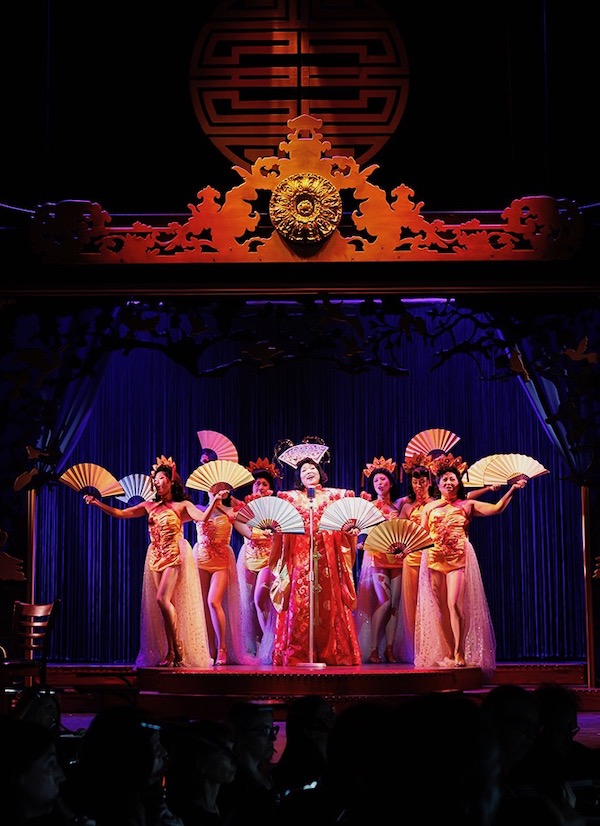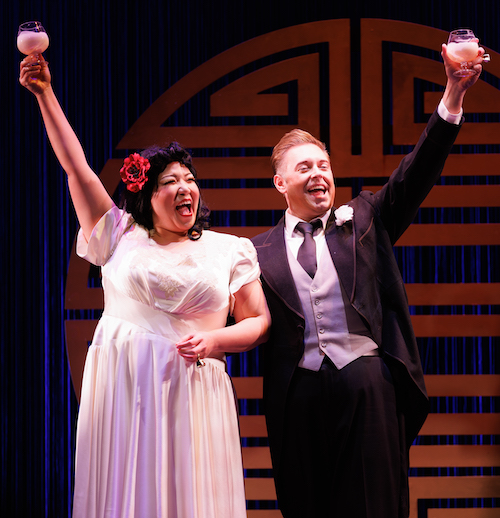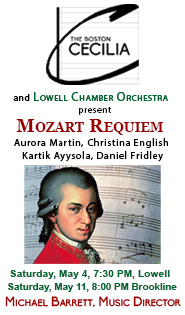Incongruities apart, a fine cast makes BLO’s revamped “Butterfly” a moving experience

Karen Chia-Ling Ho as Cio-Cio San performs in 1941 San Francisco nightclub in Puccini’s Madama Butterfly at Boston Lyric Opera. Photo: Ken Yotsukura
Three years after shelving a planned run of Giacomo Puccini’s Madama Butterfly because of questions about the opera’s depictions of its Asian characters and then engaging in a public reckoning with those issues called The Butterfly Process, Boston Lyric Opera unveiled a new production of the work at Emerson’s Colonial Theatre on Thursday night.
To be sure, Butterfly’s libretto (by Luigi Illica and Giuseppe Giacosa after a short story by John Luther Long) is anything but flawless. First performed in 1904, the opera’s plot is sentimental, several characters are one-dimensional cutouts, and its grasp of Japanese culture is – certainly by modern standards – blinkered. Most problematic is that the narrative turns on a point of what today we’d recognize as child trafficking, with the title character, a 15-year-old girl, being married off to an American naval officer when he leases a house in 1850s Nagasaki.
BLO’s new Butterfly, directed by Phil Chan, sidesteps the last by making Cio-Cio San an adult (admittedly not much of a stretch, since no teenager is ever cast in the role). In a nod to Miss Saigon, she’s a nightclub singer in 1941 San Francisco and her “marriage” to Benjamin Franklin Pinkerton is part of the nightly show, in which a member of the audience is chosen to participate in a “traditional” Japanese wedding.
The last two acts of the opera unfold in an internment camp in Arizona where Butterfly’s been removed with her child by Pinkerton. In the new telling, the boy is sick with tuberculosis. Pinkerton, having fought in World War 2 and been wounded, comes with his wife, Kate, to see him. Butterfly, realizing she can’t save her son while imprisoned, agrees to turn him over to his father – only, in the interim, the child has died.
To be sure, Chan’s revision has its merits. The story is compelling, the settings more immediate than those of 19th-century Japan. The character’s motives, too, are clear. Butterfly has agency: she’s no longer the helpless, sexualized embodiment of idealized Asian womanhood. Pinkerton, though not exactly a hero, emerges as more than just a callow playboy. Centering the opera’s climax on the child is logical and makes for good drama (even if the subplot isn’t properly weighted).
But it’s not the tale to which Puccini was privy nor the one for which he wrote the music.
Inevitably, awkward moments result from this revision, some big, some small. Sharpless’s heartfelt entreaties to Pinkerton in Act 1, for instance, simply don’t make sense if his marriage to Butterfly is nothing more than a “wedding skit.”
The Bonze’s denunciation of his niece for hiding her Japanese heritage is confusing (in the original, she converts to Christianity – which lends weight to Suzuki’s later invocations of the Trinity; here, those just stand out strangely). Why the interned Goro is trying to marry off an interned Cio-Cio San to a “Mr. Dori from Chicago” (or how, practically, that would work) is anyone’s guess.
Most incongruous are Butterfly’s continued paeans to American goodness and greatness from behind bars. Traditionally, these function as something of a life raft for her: cast out by her family and community, she clings to her hope in Pinkerton and the country he serves. When that trust ultimately proves misplaced, she takes her life, humiliated and heartbroken. In the context of an internment camp, though, such sentiments smack of delusion.
True, Chan and his creative team, which includes no less than four dramaturgs of Asian heritage – Nina Yoshida Nelsen, Arthur Dong, Karen Inouye, and Ashlyn Aiko Nelson – have rooted all of their adaptations in the historical record. The fact that most of those interned by the Roosevelt administration returned to civilian life after the war and a good number also served in the military perhaps explains Butterfly’s conflicted feelings.
Still, maybe the best thing that could have come from the Process, given the course with which Chan and his collaborators went, would have been the commissioning of a completely new libretto to deal with all the hiccups their changes to the original have provoked. A drastic measure, certainly, but, as things stand, this new Butterfly is riddled with silly anachronisms (Butterfly “contributing” to a non-existent pre-Pearl Harbor war effort, for instance), a clunky framing device, and some perplexing choreography.
That said, there are also some well-intentioned and moving moments. Chan is telling a necessary story, a reminder of which comes during a montage of imprisoned Japanese families in a touching, if slightly heavy-handed, accompaniment to the Prelude to Act 3. Whether or not this piece, as framed, is the correct vehicle for such an undertaking is, however, a question the production doesn’t fully answer.
__________
Where this Butterfly triumphs unequivocally is in its casting.
Making her BLO debut, Karen Chia-Ling Ho imbued the title role with an appealing blend of pathos and playfulness. Her performance seemed to grow in strength as the night proceeded: “Un bel di vedremo” rang purely and she soared through the climax of “Tu? Tu? Piccolo iddio!”

Karen Chia-Ling Ho in the title role and Dominick Chenes as Pinkerton in BLO’s Madama Butterfly. Photo Ken Yotsukura
Ho had fine chemistry, too, with Dominick Chenes’ Pinkerton, the duo offering a fervent take on the Act 1 love duet. In his early scenes, Chenes, who was also making his company debut, exhibited a clarion tenor that embodied the swagger of carefree youth. His short Act 3 appearance, as a wounded veteran, carried just the right, shaded tonal heft.
As Suzuki, Alice Chung sang with terrific dramatic force and beautiful tone. Troy Cook’s Sharpless sounded underpowered in Act 1 but he brought force and gravitas to his scenes in Acts 2 and 3. Hyungjin Son’s Uncle Bonzo blustered agreeably while Rodell Rosel’s Goro (here, the nightclub manager in addition to being a matchmaker) proved a delightful sleazebag. Vera Savage’s Kate proved nearly an afterthought, though, sounding distant in her short scene.
Most impressive was Neko Umphenour as Butterfly’s son, Dolore. That a kindergartener could exhibit the professionalism this young man did through a long, late night is astonishing. Yet he managed all his moments on stage superbly.
David Angus presided over the whole enterprise with a sure hand, drawing playing of lushness and warmth from the BLO orchestra. The Colonial has no true pit, which flatters the ensemble even as it threatens balances on the stage. To Angus’s credit, there were precious few moments of voices being swamped by instruments on Thursday.
Yu Shibagaki’s sets efficiently conveyed both the nightclub setting and the internment camp. Sara Ryung Clement’s period costumes and Jeanette Oi-Suk Yew’s lighting design were likewise neatly integrated into the larger production, which was, throughout, commendable for its realism and visual unity.
Boston Lyric Opera’s Madama Butterfly repeats at 3 p.m. September 17 and 24, and 7:30 p.m. September 22 at Emerson’s Colonial Theatre. blo.org
Posted in Performances


